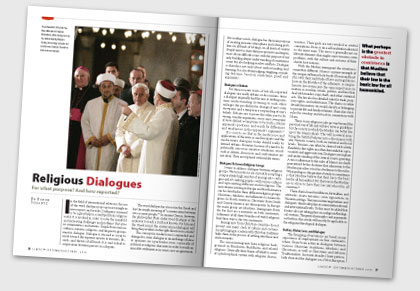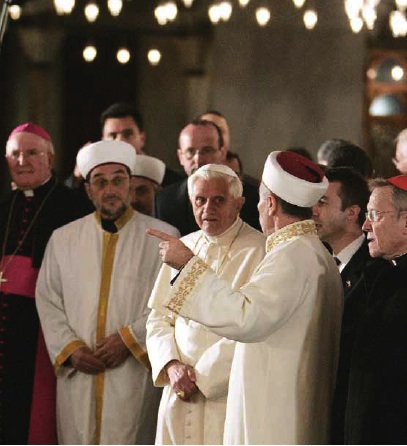Religious Dialogues
Borge Schantz September/October 2010
In the field of international relations, the use of the word dialogue pops up increasingly in news reports and articles. Dialogue is assumed to be a great help in a multipolitical, religious world. It is invoked in order to solve the manifold and increasing challenges and problems that arise in communities and nations. People from various cultures, nations, religions, and linguistic groups meet in dialogue. Dialogue is stressed as a way to move toward the supreme answer to tensions, discords, and threats of all kinds. It is said to lead to cooperation between parties in a dispute.
The word dialogue has its root in the Greek and has the simple meaning of "a conversation between two or more people."1 In ancient Greece, however, the philosopher Plato understood dialogue as the endeavor to reach a truth not known. For him and the Greek mind, the conversation (dialogue) will bring the partakers in the right direction to a truth.2
The concept in modern use is expanded and changed to cover dialogue as an exchange of ideas or opinions on a particular issue, especially of political or religious character in order to reach an amicable settlement or in some cases an agreement. Put in other words, dialogue has the main purpose of creating an irenic atmosphere and solving problems in all kinds of settings, on all levels of society. People meet to share their perspectives and experiences about difficult issues with the purpose of not only building deeper understanding of contentious issues but also helping resolve conflicts. Dialogue is therefore not only about understanding and learning. It is also about judging, weighing, or making decisions, based on convictions, proof, and arguments.
Dialogue or Debate
For these reasons most—if not all—reported dialogues are really debates or discussions. Since a dialogue originally had the aim at seeking common understanding, listening to each other enlarges the possibility for change of one's own viewpoint and a temporary suspending of one's beliefs. Debates are to prove the other part to be wrong, win the arguments, stress one's own point of view, defend assumptions to be truth, criticize opponent's positions, and search for differences and weaknesses in the opponent's arguments.3
It is easy to see that in the modern use and applications of the term as used in reports and the media many dialogues today should really be termed debates. However, because of a need to be politically correct in sensitive situations, words such as debate, discussion, and confrontation are not ideal. They are replaced with milder terms.
 Dialogs Between Religious Groups
Dialogs Between Religious Groups
I want to address dialogue between religious groups. Western nations are currently accepting a comparatively high number of immigrants—refugees and job-seeking people—with various cultures and representing different world religions. The new citizens arriving in Europe and North America can be classified in three different religious groups: Christians, Muslims, and adherents to Asian religions. In North America, Christians from South and Central America are the majority. In Europe the main group are Muslims. Immigrants from the Far East are a minority on both continents. Adherents of all three branches of world religions find their way to the two continents.
Immigrants from Christian countries do not present any major clash of culture and customs. An upbringing in a nation with Christian traditions helps them in the process of settling into these new environments.
The Asian immigrants have religious backgrounds in Hinduism, Buddhism, and related religions. Generally their frame of beliefs is more of a philosophical system with religious characteristics. Their gods are not revealed as central conceptions. Focus is on a self-realization directed to the inner man. The stress is generally not on lifestyle elements that might cause tensions, even problems, with the culture and customs of their chosen host nations.
With the Muslim immigrant the situation is somewhat different. Islam is a prime example of the unique influence holy books (Koran and hadith), with their multitude of laws and regulations, have on the lifestyles of the adherents. A comprehensive law-system puts the same importance on matters as worship, rituals, politics, and laws that deal with murder, rape, theft, and other criminal acts. The law also has detailed rules for trade, property rights, and inheritance. The sharia is rather detailed in matters we would classify as belonging to private life and family relations. Sharia has strict rules for worship and rituals in connection with Islam.
These strict religious rules go way beyond the personal way of life and will also serve as guidelines for the society in which the Muslim can better live up to the Islamic ideals. This will in several areas bring the faithful believer into a dissonance with any Western society, both on national and local levels. Tensions can often be cleared with a little flexibility. But rights are often demanded in a provocative and aggressive way. Dialogues are in place and understanding of the central issue is growing. A strict adherence to the rules of Islam is no doubt guaranteed by the doctrine that admission to the Muslim paradise is tied in obedience to the rules. What perhaps is the greatest obstacle to coexistence is that Muslims believe that their law is the basic law for all humankind. For that reason the Muslims are to strive to have their law introduced in all countries.4
These sharia-based worldviews, formalities, and attitudes create tensions, even opposition, in Western settings. They necessitate negotiations and dialogues, which take place at community, national, and international levels. To this must be added that forums also are taking place on a religious/theological stratum. The general principles and arguments set forth in this article will mostly be applicable to the religious/theological dialogue.
Deities, Divine Laws, and Dialogue
The foregoing observations are based on my experience of employment on four continents, where I have been active in dialogues between various Christian traditions, Muslims and Christians, as well as Christians and African Traditionalists. In recent decades I have particularly observed the dialogues on a West-European platform. These dialogues are in the context of a growing Muslim population putting forth their demands to live their lives according to Islamic rules and regulations. I have also been made acquainted with various international dialogues in which Christians and Muslims attempt to find similarities and points of agreement between their two monotheistic religions.
Dialogues on political, communal, and international affairs can proceed in a democratic way, when parties have agreed on procedures, and be solved amicably. New situations can often lead people and parties to agree on another way of doing things.
However, in a religious dialogue, in which both parties are faithful to their convictions, there are issues that cannot be solved even by the highest degree of flexibility. They are beyond the give-and-take business. In such dialogues, matters are complicated—as regulations for the daily life and rules for rituals generally have their origin with the deities. They are from the Omnipotent and as divine absolutes they cannot be negotiated, changed, or even questioned. To this must be added that obedience to the divine laws is in the case of most religions a condition for admission to a blessed state after death. This makes full conformity to the divine laws necessary and attractive.
It could be claimed that in the Muslim/Christian dialogue the Christians generally have more room for flexibility and conformity. In Christianity, divine laws and regulations are condensed to the brief and direct precept in the Ten Commandments explained, interpreted, and applied by Jesus Christ both in words and in deed. Examples from the lives of Bible characters, from both the Old and the New Testaments, can bring further instructions as how to put the rules into practice. There is room for certain compromises when chosen and accepted biblical absolutes are not touched. To this must be added that in the late Middle Ages eras with Reformation, Renaissance, and Enlightenment, many Christian traditions undertook an understanding of principles that granted freedom of speech and religious liberty to people of other faiths.
However, the detailed Islamic laws collected in sharia, in minute detail, give rules on how the individual should live and act. Muslims believe it covers all commands and wishes from Allah and is the condition for living a life that is acceptable for salvation. No interpretations or adaptations are allowed. What is the rule in Saudi Arabia is also the rule in Switzerland. Knowledge and Terminology
Knowledge and Terminology
Dialogues between representatives of two different religions or even diverging factions in the same religious group can have at least two valid reasons.
Dialogue can be called to solve matters relating to the smooth running of the local society, and revolve around cases in which obedience to religious rules might collide with established traditions and practices of neighbors belonging to another religion. Included in such a dialogue might be days with public religious festivities, architecture and sites of places of worship, classroom schedules and subjects, and school vacations.
The other reason is more academic. A dialogue can be a grand opportunity to share understanding and explore greater knowledge and promote communication. People who are appointed to be partakers in such dialogues should ideally prepare themselves for the meeting by gaining knowledge of the beliefs, rituals, and history of the religion held by persons on the other side of the table. These studies should especially seek to find out the untouchable absolutes and the negotiable alternatives, as well as discover the religious alternatives that in some regional circumstances are negotiable.
In these exchanges of views where there is a search for similarities as well as dissenting points, participants have to be appreciative of terminologies. Similar words in religious terminology can mean quite different things and cover dissimilar concepts. For instance, the word Eucharist (Communion) does not mean the same to Roman Catholics as it does to Lutherans. In a dialogue between the two traditions the term has to be defined. Similarly, the word Allah (Arab word for deity) is used both in the Islamic Koran and in Arabic translations of the Bible. However, the word itself calls forth different conceptions in the minds of Muslims in the mosques and the Christians in the Assyrian churches in Iraq.
Linguistic anthropology deals with what are called false friends. False friends are pairs of words in two languages or dialects that look and sound similar but differ in meaning. Take, for instance, the word gift in English and German. In English it is a term for an "object that is given." However, in German the word means "poison." Even in the same language the words can be false friends. To "table a motion" means in England to place an item on the agenda, while in the United States it means exactly the opposite—to remove it from consideration.5
False Friends in Religious Terminology
In the same way I suggest that there is a critical and dangerous "false friends" terminology that can completely misdirect both the dialogue and the reporting of meetings where Christians and Muslims are in dialogue.
Points in the agenda for the discussions often use short captions on the most important doctrines in Christianity and Islam. They can in both religions use brief headlines for things such as a belief in One God, Holy Books, Angels, Second Coming of Jesus, and Day of Judgment. To these captions could be added Heaven, Punishment of Sinners, Resurrection, Salvation, Prayer, Charity, etc.6
When they meet around the table, however, participants soon get into debates on the vast differences on what the headlines stand for in the two religions. On both sides of the table they believe in one God. However, the concepts covered by the brief captions are in this case vastly different. The procedures connected with the day of judgment as taught by the Christians and Muslims are hardly comparable. The events before the second coming of Jesus, the reasons for His coming, and the result of this climax of history are so contradictory that it strictly should not have the same headline. The same goes for most of the other beliefs.
The captions for subjects to be discussed can be the same. However, hopefully, the debate itself will reveal that the participants have done their homework and together the parties have discussed issues, touched upon the absolutes, and dealt with alternatives and negotiable doctrines in a way that will further cooperation.
Problematic Results and Reporting
Dialogue is a very delicate process. That is especially true for the Christian/Muslim kinds. Many obstacles often strain the conversations. Confrontational communication results in discussion and debate. Obstructions include exercise of power, mistrust, external influences, distractions, poor communication conditions, and even fear of retaliation. These factors can all prevent a good result from emerging. The divine absolutes that guide both religions in their belief systems, a strong factor in culture and customs and directly responsible for the formation of lifestyles, are not up for change and adaptation. In some cases they are not even open for debate. Dialogue between Muslims and Christians can hardly result in alterations; even modification is subject to much interpretation.
Another misleading outgrowth of dialogue is an agreement made by unrepresentative groups. One faction may see their own religion through very different spectacles than the mainstream or another faction. And agreements with so-called moderates in either Christianity or Islam may be perceived by the mainlines in each as only between nominalists, liberals, or even heretics and apostates.
In the brief reports in the daily press the results of these dialogues are in many cases a list of headlines that mention that the two groups in the debates agree that both religions believe in one God, holy scriptures as the authority, paradise and hell, and so on. However, the detailed facts the captions in many cases stand for are completely different concepts in the two religions. That is deceptive to the common persons on both sides who do not claim to know the actual details of a neighbor's religious beliefs.
1 The American Heritage Dictionary, 1982.
2 Dialog og debat og kritik. By John W. Hoerbo. Jyllands Posten, February 10, 2010.
3 http//en.wikipedia.org/wiki/Bohm _ Dialogue.
4 Borge Schantz, Islam in the Post 9/11 World (Grantham, U.K.: Autumn House, 2003). p. 36.
5 http//en.wikipedia.org/wiki/False_friend
6 Paul Marshall et al., Islam at the Crossroads (Grand Rapids: Baker Books, 2002), pp. 36-39.